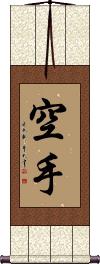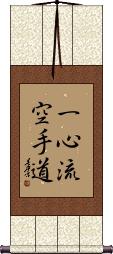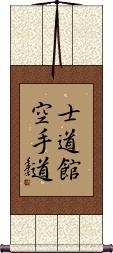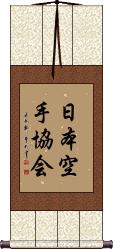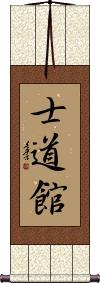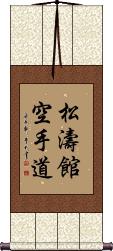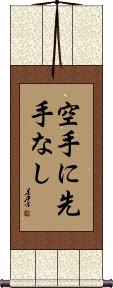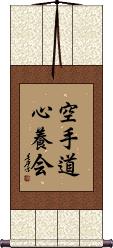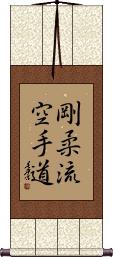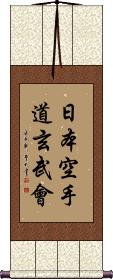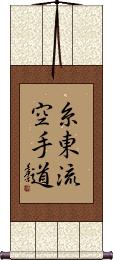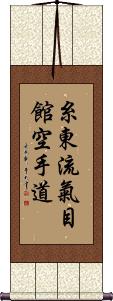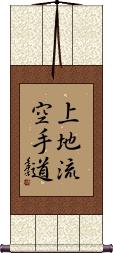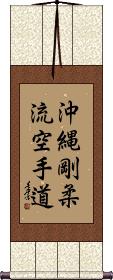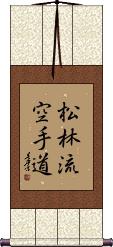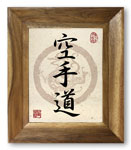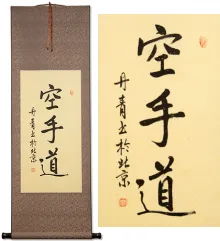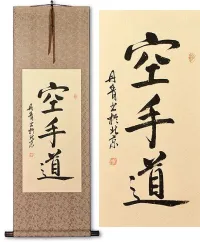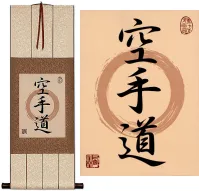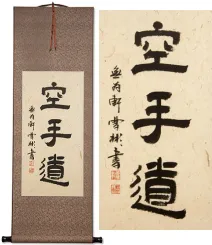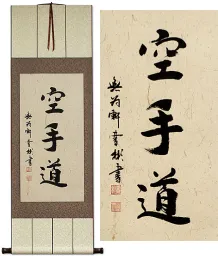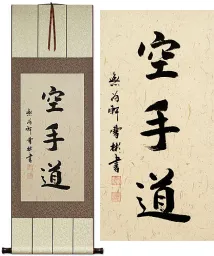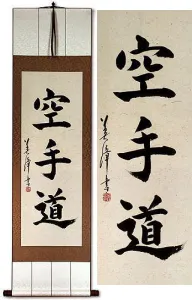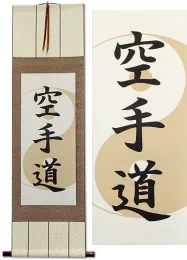Many custom options...
And formats...

Karate in Chinese / Japanese...
Buy a Karate calligraphy wall scroll here!
Personalize your custom “Karate” project by clicking the button next to your favorite “Karate” title below...
See also: Martial Arts Words and Phrases
1. Karate
2. Law of the Fist Karate / Kempo Karate
3. Karate-Do
5. Kempo Karate / Law of the Fist Empty Hand
9. Japanese Karate Association
10. Shidokan
11. Tang Soo Do / Tang Hand Way
13. Okinawa Karate
14. Kenka Karate
16. Nihon Karate-Do
25. Wado-Ryu Karate
27. Nippon Karate-Do Genbu-Kai
29. Shito-Ryu Ki-Me-Kan Karate-Do
Karate
空手 is the short and widely-used-in-English version of karate-do without the “do” or “dao” at the end.
Literal meaning: Empty Hand.
Law of the Fist Karate / Kempo Karate
The first two characters mean “fist law” which is Romanized from Japanese as “Kenpo” or “Kempo.”
The last two are a secondary way to express “karate.”
Notes:
The more common way to express “karate” is literally “empty hand” (meaning “without weapons in your hand”). This version would be translated literally as “Tang hand” (as in the Tang Dynasty) or “China hand” (sometimes “Tang” means “China” in Japanese). Even though the character for “Tang” is used instead of “empty,” it's still pronounced “kara-te” in Japanese.
拳法唐手 is not commonly used in China - so please consider it to be a Japanese-only title.
Many Japanese people will say the last two Kanji are the old and antiquated way of saying Karate. This fact does not stop this title from existing, as these four characters are often seen in Kenpo / Kempo Dojos around the western world.
Karate-Do
The literal meaning of 空手道 is “empty hand method” or “empty hand way.”
It is acknowledged that karate originated in China but migrated to Japan, where it was refined and became widely popular.
Karate is a martial art that uses no blades or weapons other than the “natural weapons” God gave to humans (fists and feet). The last character somehow became optional, but the meaning of that character is “method” or “the way” as in Taoism / Daoism.
Karate-Do reached Korea, where it is known as 공수도 which can be romanized as “Kong Soo Do” or “Gong Su Do.”
Danketsu Karate-Do
団結空手道 is the title for Danketsu Karate-Do, a dojo located in Stroudsburg, PA.
団結 (danketsu) means union, unity, or combination.
空手道 (karate-do) means “empty hand way.”
If you need you martial arts school/dojo/academy added to my database, just give me the info (actual Chinese/Japanese text if you have it).
Kempo Karate / Law of the Fist Empty Hand
空手拳法 is the Kanji title for Kempo Karate.
The first two characters mean “karate” - technically they express “empty hand.”
The last two express “fist law” which is Romanized from Japanese as “Kenpo” or “Kempo.”
That “empty hand” translation can be understood better when you grasp the idea that karate is a martial art without weapons (other than the weapons organic to your body, such as your foot, hand, fist, etc). When you practice karate, you do so with empty hands (no weapons).
Note: There is also an antiquated way to write karate. It has the same pronunciation but a different first character which means “Tang” as in the Tang Dynasty. Some dojos use that form - let us know if you need that alternate form, and we'll add it.
Isshin Ryu Karate Do
一心流空手道 is the full title for Isshin-Ryu Karate-Do.
The literal meaning is “one heart method empty hand way.”
There are other ways to translate this, but if you are looking for this title, you already know that.
This would make a great wall scroll for your dojo or private studio if you study this form of Japanese (technically from Okinawa) Karate.
Because this is a specifically-Japanese title, I strongly recommend that you select our Japanese Master Calligrapher to create this artwork.
Kakuto Karate
Shidokan Karate-Do
Japanese Karate Association
Shidokan (Karate)
Tang Soo Do / Tang Hand Way
唐手道 is the alternate title for Karate-do.
This title uses a character, 唐, which represents the Tang Dynasty of China. Thus, this is often translated as the “Tang Hand Way” or incorrectly, “Tang Fist Way.”
I have also seen some call it “China Hand Way.”
Many in Korea refer to and romanize these characters as “Tang Soo Do” (당수도) where these characters refer to a kind of Korean style of Karate.
There is not a lot of information on this title but some believe that a simplified form of Kung Fu that started in China and ended up very popular in Japan used this title initially. It was later changed in Japan to a different Karate title which means “Empty Hand” (as in, without weapons).
Note: When used in Korean, this is pronounced 당수도. This title is often romanized as “Tang Soo Do,” “Tangsudo,” “Dang Su Do,” or “Dangsudo.” The last two romanizations on that list are the official Korean government romanization, though martial arts schools tend to use other non-standard versions.
Shotokan Karate-Do
鬆濤館空手道 art the Japanese Kanji that make up the title for Shotokan Karate.
This should be considered a Japanese-only title. It does make sense and is pronounceable in Chinese and Korean but only as a title for a building (perhaps a martial arts hall) surrounded by pine trees - followed by the characters for “The empty hand method” (kong shou dao / Karate-do). Also, the first two characters were simplified in both Japanese and Chinese. The third character was simplified in Chinese but not Japanese.
Upon request, we can offer the fully traditional Chinese version but be sure you know what you are asking for.
Note: This would be understood in Chinese and Korean Hanja by a person from those cultures familiar with martial arts and various schools of Japanese karate.
Okinawa Karate
Kenka Karate
Kyokushin Karate-Do
Nihon Karate-Do
Karate Ni Sente Nashi
Flying Dragon Karate-Do
White Crane Karate
Shoshin Karate-do Dojo
Snow Leopard Karate-Do
Karate-Do Shinyo-Kai
Nippon Karate Kyokai
Shoshin Karate Dojo
Wado-Ryu Karate
Goju Ryu Karate-Do
Nippon Karate-Do Genbu-Kai
Japanese Genbu Karate Club
日本空手道玄武會 is the title for Nippon Karate-Do Genbu-Kai.
A Japanese karate association of the Genbu school.
Note that while this title does make perfect sense in Chinese, it is really a Japanese title. In fact, the first word is “Japanese/Japan.”
If you’d like your martial arts school, dojo or club added to our calligraphy database for easy ordering of a custom calligraphy wall scroll, just contact me.
Shito-Ryu Karate-Do
Shito-Ryu Ki-Me-Kan Karate-Do
Uechi-Ryu Karate-Do
Okinawa Goju Ryu Karate-Do
Matsubayashi-Ryu Karate-Do
鬆林流空手道 is the Japanese title for the Matsubayashi-Ryu Karate-Do school of martial arts.
If directly translated, it means “Pine Forest Style Empty Hand Way.”
Notes:
1. 松林流 can be pronounced Matsubayashi-Ryū or Shōrin-Ryū. This can be confusing as Shōrin can also represent 少林 which refers to the Shaolin (little forest) style.
2. 松 can also be written in the traditional form of 鬆.
This in-stock artwork might be what you are looking for, and ships right away...
Gallery Price: $90.00
Your Price: $49.88
Gallery Price: $70.00
Your Price: $29.00
Gallery Price: $200.00
Your Price: $98.88
Gallery Price: $200.00
Your Price: $118.88
Gallery Price: $268.00
Your Price: $148.77
Gallery Price: $103.00
Your Price: $56.88
Gallery Price: $106.00
Your Price: $58.88
Gallery Price: $106.00
Your Price: $58.88
The following table may be helpful for those studying Chinese or Japanese...
| Title | Characters | Romaji (Romanized Japanese) | Various forms of Romanized Chinese | |
| Karate | 空手 | kara te / karate | kōng shǒu kong1 shou3 kong shou kongshou | k`ung shou kungshou kung shou |
| Law of the Fist Karate Kempo Karate | 拳法唐手 | ken pou kara te kenpoukarate ken po kara te | quán fǎ táng shǒu quan2 fa3 tang2 shou3 quan fa tang shou quanfatangshou | ch`üan fa t`ang shou chüanfatangshou chüan fa tang shou |
| Karate-Do | 空手道 | kara te dou karatedou kara te do | kōng shǒu dào kong1 shou3 dao4 kong shou dao kongshoudao | k`ung shou tao kungshoutao kung shou tao |
| Danketsu Karate-Do | 団結空手道 | dan ketsu kara te dou danketsukaratedou dan ketsu kara te do | ||
| Kempo Karate Law of the Fist Empty Hand | 空手拳法 | kara te ken pou karatekenpou kara te ken po | kōng shǒu quán fǎ kong1 shou3 quan2 fa3 kong shou quan fa kongshouquanfa | k`ung shou ch`üan fa kungshouchüanfa kung shou chüan fa |
| Isshin Ryu Karate Do | 一心流空手道 | i sshin ryuu kara te dou isshinryuukaratedou i shin ryu kara te do | ||
| Kakuto Karate | 格闘空手 | kaku tou kara te kakutoukarate kaku to kara te | ||
| Shidokan Karate-Do | 士道館空手道 | shi dou kan kara te dou shidoukankaratedou shi do kan kara te do | ||
| Japanese Karate Association | 日本空手協會 日本空手協会 | ni hon kara te kyou kai nihonkaratekyoukai ni hon kara te kyo kai | rì běn kōng shǒu xié huì ri4 ben3 kong1 shou3 xie2 hui4 ri ben kong shou xie hui ribenkongshouxiehui | jih pen k`ung shou hsieh hui jihpenkungshouhsiehhui jih pen kung shou hsieh hui |
| Shidokan (Karate) | 士道館 | shi dou kan shidoukan shi do kan | ||
| Tang Soo Do Tang Hand Way | 唐手道 | kara te do / karatedo | táng shǒu dào tang2 shou3 dao4 tang shou dao tangshoudao | t`ang shou tao tangshoutao tang shou tao |
| Shotokan Karate-Do | 鬆濤館空手道 松涛館空手道 | shou tou kan kara te dou shoutoukankaratedou sho to kan kara te do | sōng tāo guǎn kōng shǒu dào song1 tao1 guan3 kong1 shou3 dao4 song tao guan kong shou dao songtaoguankongshoudao | sung t`ao kuan k`ung shou tao sungtaokuankungshoutao sung tao kuan kung shou tao |
| Okinawa Karate | 沖縄空手 | oki nawa kara te okinawakarate | chōng shéng kōng shǒu chong1 sheng2 kong1 shou3 chong sheng kong shou chongshengkongshou | ch`ung sheng k`ung shou chungshengkungshou chung sheng kung shou |
| Kenka Karate | けんか空手 | kanka karate kankakarate | ||
| Kyokushin Karate-Do | 極真空手道 | kyoku shin kara te dou kyokushinkaratedou kyoku shin kara te do | ||
| Nihon Karate-Do | 日本空手道 | ni hon kara te do nihonkaratedo | ||
| Karate Ni Sente Nashi | 空手に先手なし | karate ni sente nashi karatenisentenashi | ||
| Flying Dragon Karate-Do | 飛龍空手道 飞龙空手道 | hi ryuu kara te dou hiryuukaratedou hi ryu kara te do | fēi lóng kòng shǒu dào fei1 long2 kong4 shou3 dao4 fei long kong shou dao feilongkongshoudao | fei lung k`ung shou tao feilungkungshoutao fei lung kung shou tao |
| White Crane Karate | 白鶴空手 | shiro tsuru kara te shirotsurukarate | ||
| Shoshin Karate-do Dojo | 正心空手道道場 | shou shin kara te dou dou jou shoushinkaratedoudoujou sho shin kara te do do jo | ||
| Snow Leopard Karate-Do | 雪豹空手道 | yukihyou karate yukihyoukarate yukihyo karate | xuě bào kōng shǒu dào xue3 bao4 kong1 shou3 dao4 xue bao kong shou dao xuebaokongshoudao | hsüeh pao k`ung shou tao hsüehpaokungshoutao hsüeh pao kung shou tao |
| Karate-Do Shinyo-Kai | 空手道心養会 | kara te dou shin you kai karatedoushinyoukai kara te do shin yo kai | ||
| Nippon Karate Kyokai | 日本空手協會 日本空手協会 | nippon karate kyokai nipponkaratekyokai nipon karate kyokai | ||
| Shoshin Karate Dojo | 正心空手道場 | shou shin kara te dou jou shoushinkaratedoujou sho shin kara te do jo | ||
| Wado-Ryu Karate | 和道流空手 | wa dou ryuu kara te wadouryuukarate wa do ryu kara te | ||
| Goju Ryu Karate-Do | 剛柔流空手道 刚柔流空手道 | gou juu ryuu kara te dou goujuuryuukaratedou go ju ryu kara te do | ||
| Nippon Karate-Do Genbu-Kai | 日本空手道玄武會 日本空手道玄武会 | ni ppon kara te dou gen bu kai nipponkaratedougenbukai ni pon kara te do gen bu kai | rì běn kōng shǒu dào xuán wǔ huì ri4 ben3 kong1 shou3 dao4 xuan2 wu3 hui4 ri ben kong shou dao xuan wu hui | jih pen k`ung shou tao hsüan wu hui jih pen kung shou tao hsüan wu hui |
| Shito-Ryu Karate-Do | 糸東流空手道 糸东流空手道 | shii tou ryuu kara te dou shiitouryuukaratedou shi to ryu kara te do | ||
| Shito-Ryu Ki-Me-Kan Karate-Do | 糸東流氣目館空手道 糸东流気目馆空手道 | shito-ryu ki-me-kan karate-dou shito-ryu ki-me-kan karate-do | mì dōng liú qì mù guǎn kōng shǒu dào mi4 dong1 liu2 qi4 mu4 guan3 kong1 shou3 dao4 mi dong liu qi mu guan kong shou dao | mi tung liu ch`i mu kuan k`ung shou tao mi tung liu chi mu kuan kung shou tao |
| Uechi-Ryu Karate-Do | 上地流空手道 | ue chi ryuu kara te dou uechiryuukaratedou ue chi ryu kara te do | ||
| Okinawa Goju Ryu Karate-Do | 沖縄剛柔流空手道 沖縄刚柔流空手道 | oki nawa gou juu ryuu kara te dou oki nawa go ju ryu kara te do | ||
| Matsubayashi-Ryu Karate-Do | 松林流空手道 | matsu bayashi ryuu kara te dou matsu bayashi ryu kara te do | ||
| In some entries above you will see that characters have different versions above and below a line. In these cases, the characters above the line are Traditional Chinese, while the ones below are Simplified Chinese. | ||||
Successful Chinese Character and Japanese Kanji calligraphy searches within the last few hours...
